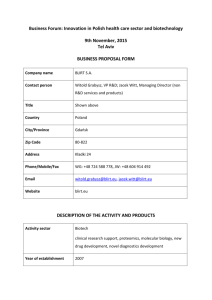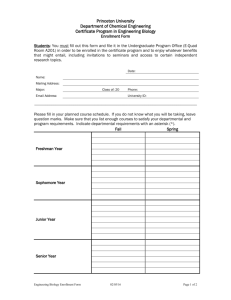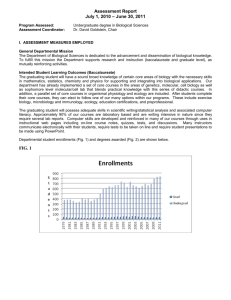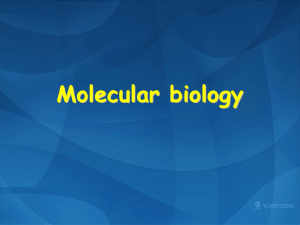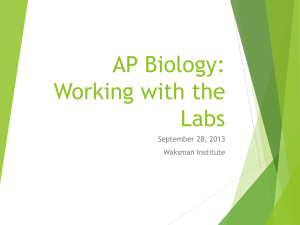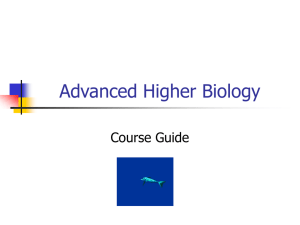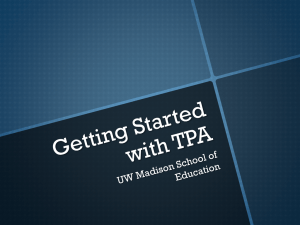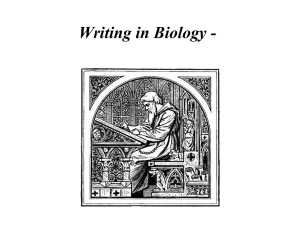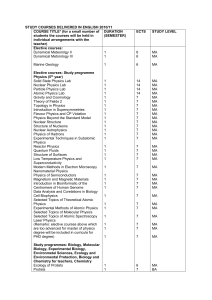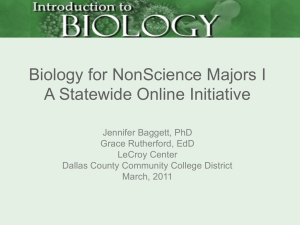Student Learning Goals - Council on Undergraduate Research
advertisement
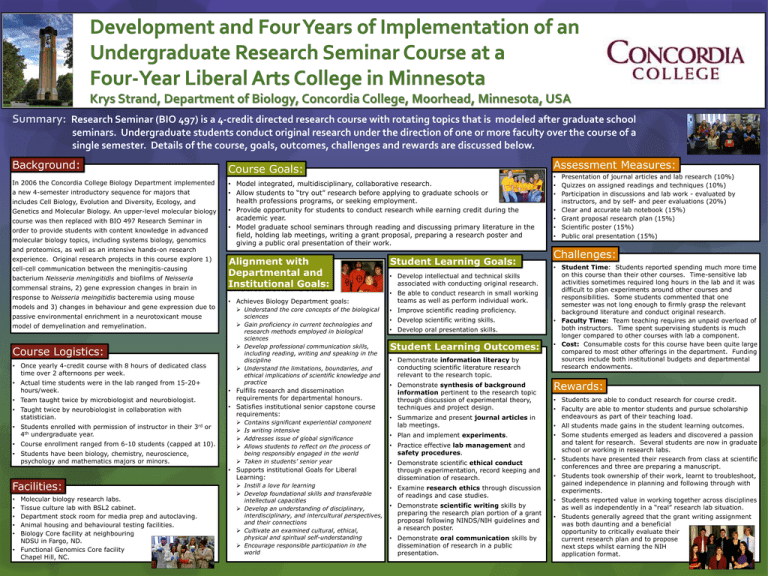
Krys Strand, Department of Biology, Concordia College, Moorhead, Minnesota, USA Summary: Research Seminar (BIO 497) is a 4-credit directed research course with rotating topics that is modeled after graduate school seminars. Undergraduate students conduct original research under the direction of one or more faculty over the course of a single semester. Details of the course, goals, outcomes, challenges and rewards are discussed below. Background: Course Goals: In 2006 the Concordia College Biology Department implemented a new 4-semester introductory sequence for majors that includes Cell Biology, Evolution and Diversity, Ecology, and Genetics and Molecular Biology. An upper-level molecular biology course was then replaced with BIO 497 Research Seminar in order to provide students with content knowledge in advanced molecular biology topics, including systems biology, genomics and proteomics, as well as an intensive hands-on research experience. Original research projects in this course explore 1) cell-cell communication between the meningitis-causing bacterium Neisseria meningitidis and biofilms of Neisseria commensal strains, 2) gene expression changes in brain in response to Neisseria meingitidis bacteremia using mouse models and 3) changes in behaviour and gene expression due to passive environmental enrichment in a neurotoxicant mouse model of demyelination and remyelination. Course Logistics: • Once yearly 4-credit course with 8 hours of dedicated class time over 2 afternoons per week. • Actual time students were in the lab ranged from 15-20+ hours/week. • Taught twice by neurobiologist in collaboration with statistician. 3rd or • Course enrollment ranged from 6-10 students (capped at 10). • Students have been biology, chemistry, neuroscience, psychology and mathematics majors or minors. Alignment with Alignment with Departmental and Departmental and Institutional Goals: Institutional Goals: • Achieves Biology Department goals: Understand the core concepts of the biological sciences Gain proficiency in current technologies and research methods employed in biological sciences Develop professional communication skills, including reading, writing and speaking in the discipline Understand the limitations, boundaries, and ethical implications of scientific knowledge and practice Contains significant experiential component Is writing intensive Addresses issue of global significance Allows students to reflect on the process of being responsibly engaged in the world Taken in students’ senior year • Supports institutional Goals for Liberal Learning: Facilities: Molecular biology research labs. Tissue culture lab with BSL2 cabinet. Department stock room for media prep and autoclaving. Animal housing and behavioural testing facilities. Biology Core facility at neighbouring NDSU in Fargo, ND. • Functional Genomics Core facility Chapel Hill, NC. • Model integrated, multidisciplinary, collaborative research. • Allow students to “try out” research before applying to graduate schools or health professions programs, or seeking employment. • Provide opportunity for students to conduct research while earning credit during the academic year. • Model graduate school seminars through reading and discussing primary literature in the field, holding lab meetings, writing a grant proposal, preparing a research poster and giving a public oral presentation of their work. • Fulfills research and dissemination requirements for departmental honours. • Satisfies institutional senior capstone course requirements: • Team taught twice by microbiologist and neurobiologist. • Students enrolled with permission of instructor in their 4th undergraduate year. Assessment Measures: • • • • • in Instill a love for learning Develop foundational skills and transferable intellectual capacities Develop an understanding of disciplinary, interdisciplinary, and intercultural perspectives, and their connections Cultivate an examined cultural, ethical, physical and spiritual self-understanding Encourage responsible participation in the world Student Learning Goals: • Develop intellectual and technical skills associated with conducting original research. • Be able to conduct research in small working teams as well as perform individual work. • Improve scientific reading proficiency. • Develop scientific writing skills. • Develop oral presentation skills. Student Learning Outcomes: • Demonstrate information literacy by conducting scientific literature research relevant to the research topic. • Demonstrate synthesis of background information pertinent to the research topic through discussion of experimental theory, techniques and project design. • Summarize and present journal articles in lab meetings. • Plan and implement experiments. • Practice effective lab management and safety procedures. • Demonstrate scientific ethical conduct through experimentation, record keeping and dissemination of research. • Examine research ethics through discussion of readings and case studies. • Demonstrate scientific writing skills by preparing the research plan portion of a grant proposal following NINDS/NIH guidelines and a research poster. • Demonstrate oral communication skills by dissemination of research in a public presentation. • Presentation of journal articles and lab research (10%) • Quizzes on assigned readings and techniques (10%) • Participation in discussions and lab work - evaluated by instructors, and by self- and peer evaluations (20%) • Clear and accurate lab notebook (15%) • Grant proposal research plan (15%) • Scientific poster (15%) • Public oral presentation (15%) Challenges: • Student Time: Students reported spending much more time on this course than their other courses. Time-sensitive lab activities sometimes required long hours in the lab and it was difficult to plan experiments around other courses and responsibilities. Some students commented that one semester was not long enough to firmly grasp the relevant background literature and conduct original research. • Faculty Time: Team teaching requires an unpaid overload of both instructors. Time spent supervising students is much longer compared to other courses with lab a component. • Cost: Consumable costs for this course have been quite large compared to most other offerings in the department. Funding sources include both institutional budgets and departmental research endowments. Rewards: • Students are able to conduct research for course credit. • Faculty are able to mentor students and pursue scholarship endeavours as part of their teaching load. • All students made gains in the student learning outcomes. • Some students emerged as leaders and discovered a passion and talent for research. Several students are now in graduate school or working in research labs. • Students have presented their research from class at scientific conferences and three are preparing a manuscript. • Students took ownership of their work, learnt to troubleshoot, gained independence in planning and following through with experiments. • Students reported value in working together across disciplines as well as independently in a “real” research lab situation. • Students generally agreed that the grant writing assignment was both daunting and a beneficial opportunity to critically evaluate their current research plan and to propose next steps whilst earning the NIH application format.
